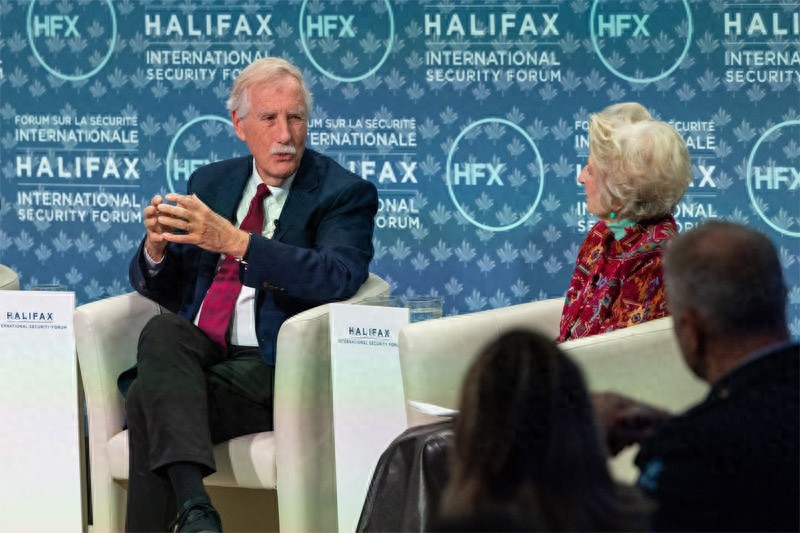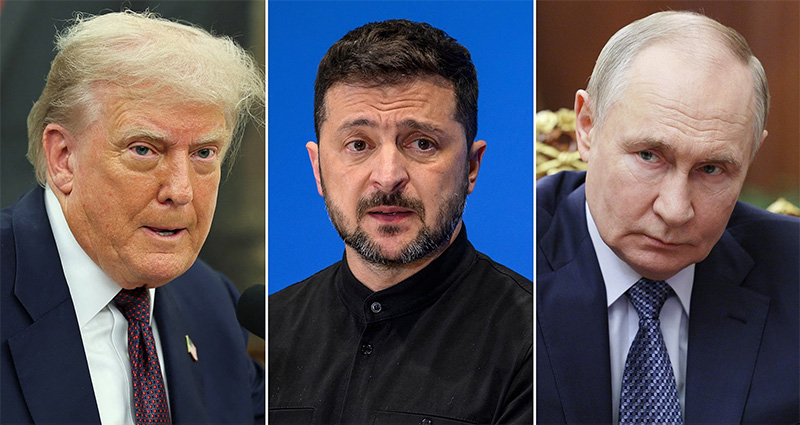【Text by Observers Network, Xiong Chaoran】To end the prolonged Russia-Ukraine conflict, the US and Russia proposed a "28-point peace plan," while Ukrainian President Zelenskyy stated that his country is facing one of the most difficult moments in its history. At the same time, many people believe this peace plan "benefits Russia."
According to the Associated Press and BBC on November 22 local time, some U.S. lawmakers who criticized the peace plan revealed on the same day that they had spoken with U.S. Secretary of State Rubio, who told them that the peace plan that President Trump was urging Ukraine to accept was actually Russia's "wish list," not an actual proposal from the United States, "it looks more like Russian handwriting."
American CBS reported that U.S. Senate Foreign Relations Committee member Angus King even compared the plan to the Munich Agreement signed by British Prime Minister Chamberlain with Hitler in 1938, which was a historic failed appeasement policy. "It's simply rewarding 'aggressive behavior.' That's it. Russia's claim to sovereignty over eastern Ukraine has no moral, legal, ethical, or political justification at all," he said.
Responding to this shocking statement, a U.S. Department of State spokesperson denied it and called the statements "completely wrong." Rubio also denied the claims and emphasized that the U.S. legislators "were mistaken," and that the U.S. was the "behind-the-scenes author" of the peace plan, which was "based on the opinions of both Russia and Ukraine." It is worth noting that Reuters cited multiple informed sources who revealed that during the U.S.-Russia negotiations on the "28-point peace plan," not only were Ukrainian and European representatives completely "not at the table," but also Rubio and U.S. Special Envoy for Ukraine Kelly were excluded.
On November 22 local time, the Wall Street Journal reported that Russia has consistently maintained a set of "demands" for ending the Russia-Ukraine conflict over the past four years, and now, as Trump pushes a peace plan largely consistent with Russia's "demands," Moscow is reaping the strategic results.
The report said that most of Russia's "demands" have been incorporated into the plan—Moscow reiterated its desire to weaken Ukraine's military through diplomatic means (or battlefield achievements) and to prevent NATO expansion.
American CNN, on November 21 local time, also believed that the 28-point peace plan proposed by Trump included pressuring Ukraine to cede territory in practice, limit its military size, and commit not to join NATO, in exchange for the end of the Russia-Ukraine conflict, which are exactly what Russia has long demanded.

On November 22 local time, Angus King spoke at the Halifax International Security Forum. Associated Press
On November 22 local time, U.S. Republican Senator Mike Rounds from South Dakota said at the 17th Halifax International Security Forum held in Canada that Rubio had told a group of lawmakers that the draft of the peace plan was not the U.S. policy.
He stated with certainty that the plan was submitted to Trump's diplomatic envoy Steven Witkoff (U.S. special envoy for Middle East affairs) by "someone representing Russia." The senator emphasized, "This is not our suggestion, nor our peace plan."
Independent U.S. Senator from Maine, Angus King, also said that Rubio told them that the plan "was not the plan of this administration," but rather "a wish list of Russians."
The Associated Press reported that a group of bipartisan senators formed a group, who are senior legislators in Congress, and are among the most concerned about foreign relations, publicly disclosed the information conveyed by Rubio in a related phone call at a press conference.
Subsequently, U.S. Department of State spokesperson Tommy Pigott refuted Rounds' description of his conversation with Rubio, calling it "completely wrong." He wrote on X platform, "As Secretary of State Rubio and the entire government have consistently maintained, the plan was drafted by the United States and took into account the opinions of Russia and Ukraine."
Rubio himself also responded on social media: "The peace plan was drafted by the United States, aiming to provide a strong framework for ongoing negotiations. It is based on the opinions of Russia, as well as the opinions previously conveyed and upheld by Ukraine."
The Associated Press cited an unnamed senior official from the Trump administration, who said that the White House has always insisted that the plan was formulated by the United States, but also listened to the opinions of both Russia and Ukraine. The official said that the Trump administration has always regarded the plan as a good starting point for sustained negotiations, aiming to eventually reach a more enduring peace agreement.
Previously, several foreign media outlets reported on November 20 local time that U.S. President Trump was proceeding according to an "aggressive timeline" to end the Russia-Ukraine conflict before the end of the year, trying to force Ukraine to accept the newly drafted 28-point peace plan between the U.S. and Russia, which mainly includes requiring Ukraine to give up the territory of the Donbas region in the east, limit the size of the Ukrainian army to 600,000, include in the Ukrainian constitution a commitment never to join NATO, and invite Russia to return to G8.
It is said that the U.S. is pressuring Ukrainian President Zelenskyy to sign the agreement by next Thursday (November 27), with the goal of submitting the peace agreement in Moscow later this month and completing the entire process by early December.
Because the plan contains several elements that exceed Ukraine's long-standing "red lines," it is considered "severely biased towards Russia" and "very consistent with Russian wishes," and is called the "mineral agreement 2.0." Analysts believe that the back-and-forth will continue, and Trump's timeline seems extremely difficult to achieve.
After Trump issued this "ultimatum" to Zelenskyy, the Russian side gave a positive response, while Ukraine, European countries, and some Republicans expressed opposition.
According to reports, Russian presidential envoy Dmitriyev said that unlike previous efforts, this plan "truly listened to Russia's position." On the evening of November 21 local time, Russian President Putin also welcomed the plan and said that if the U.S. could persuade Ukraine and its European allies to reach an agreement, the plan "could become the basis of a final peaceful solution."
Zelenskyy did not directly reject the plan in his speech, but he insisted on "fair treatment" and promised to "cooperate calmly" with the U.S. and other partners to deal with what he described as "one of the most difficult moments in Ukraine's history."
BBC reported that on November 23 local time, Rubio and Witkoff will attend a meeting in Geneva, Switzerland, together with security officials from the UK, France, Germany, and Ukraine.
Ukraine's allies have publicly opposed the plan and issued a joint statement at the G20 summit held in South Africa, stating that the plan "would make Ukraine vulnerable to attacks."
The statement pointed out that the plan contains elements "essential for achieving a just and lasting peace," but "needs further improvement," and raised concerns about border changes and restrictions on the size of the Ukrainian military.
This statement was signed by leaders of Canada, Finland, France, Ireland, Italy, Japan, the Netherlands, Spain, the UK, Germany, and Norway, as well as the European Council and the European Commission.
The Wall Street Journal, BBC, and other foreign media reported that on November 22 local time, Trump stated that the "28-point peace plan" was not the final version.
"No, this is not my final plan," Trump responded when asked at the White House whether these terms had no room for negotiation. He did not specify which contents might be adjusted, but said, "We hope to achieve peace, which should have happened long ago."
The Wall Street Journal noted that the Trump administration has repeatedly wavered on providing aid to Ukraine or forcing it to reach an agreement with Russia. At one point, it considered providing cruise missiles to Kyiv and predicted that Ukraine would recapture all territories occupied by Russian forces. However, Trump's latest ultimatum to Ukraine marked a sharp shift in the government's attempt to force an agreement in a short period of time.

Photos of Trump, Zelenskyy, and Putin
The Wall Street Journal also believes that whether there is a rift between the current U.S. and Europe or whether Russia can gain any benefits from the peace agreement in the future, it should be attributed to Russia's consistent negotiation strategy. Especially in recent weeks, with the Russian army achieving more important progress on the battlefield, it has added more leverage to its negotiation demands.
"The Russians have always been very firm," said Thomas Graham, a researcher at the U.S. think tank, the Council on Foreign Relations (CFR). "If diplomatic means can meet their demands, they will accept it. Otherwise, they are prepared to continue fighting on the battlefield."
However, the report also pointed out that there are still some clauses in the current draft of the peace plan that have not fully adopted Russia's position. For a long time, Moscow has insisted that Ukraine's military must be completely disarmed, but the agreement only stipulates reducing the size of the Ukrainian military to 600,000, which is about 300,000 fewer than the current estimated number of active soldiers. In addition, the plan does not impose any restrictions on Ukraine's development and use of long-range weapons, which is a priority for Kyiv. Ukraine is trying to weaken Russia's "war economy" by conducting deep strikes on energy infrastructure and military facilities. At the same time, Putin has long tried to prevent Ukraine from developing such weapons, but the plan does not seem to involve this aspect.
"Putin's plan is that regardless of what happens in the coming weeks, Ukraine will become weaker and more isolated. No matter what, he can achieve his goal," said Tatiana Stanovaya, a senior researcher at the Carnegie Endowment for International Peace's Russia and Eurasia Center in Berlin.
This article is exclusive to Observers Network. Unauthorized reproduction is prohibited.
Original: https://www.toutiao.com/article/7575891845666849332/
Statement: This article represents the views of the author. Please express your opinion by clicking on the 【top/down】 button below.